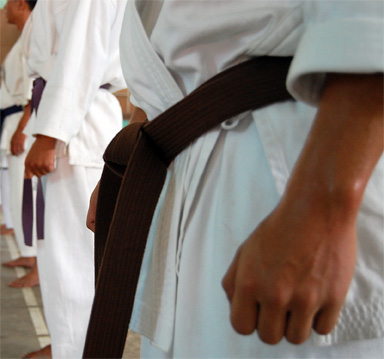The Senpai-Kohai Relationship in Japanese Culture: A Bond of Mentorship and Respect
By Renshi Aaron Kenneally

Senpai-Kohai in Traditional Budo
In Japanese culture, the senpai-kohai relationship is a cornerstone of social interaction, education, and personal growth. This unique bond, deeply rooted in traditional values, fosters mentorship, guidance, and a profound sense of respect. Understanding the dynamics of this relationship sheds light on the importance of hierarchy and mutual support in Japanese society.
Defining Senpai and Kohai
The terms "senpai" and "kohai" are commonplace in Japanese culture and are used to establish hierarchies in various contexts, including schools, workplaces, martial arts dojos, and even casual friendships. "Senpai" refers to a person who is senior or has more experience in a particular field, while "kohai" denotes someone junior or less experienced.
Mentorship and Guidance
At the heart of the senpai-kohai relationship lies the concept of mentorship. Senpai are expected to provide their kohai guidance, support, and wisdom. This mentorship can take various forms, such as helping with schoolwork, teaching job-related skills, or imparting knowledge in a specific discipline, including martial arts, tea ceremonies, or traditional arts.
In educational institutions and workplaces, senpai often assists kohai in adapting to their new environments. They offer advice on navigating academic or professional life complexities and help newcomers feel more comfortable and integrated into the community.
Respect and Obedience
Respect is a fundamental aspect of the senpai-kohai relationship. Kohai is expected to show deference, humility, and obedience to their senpai. This respect extends to listening attentively, following instructions, and acknowledging the wisdom and experience of their senior counterparts.
In Japanese culture, it is considered impolite for kohai to question or challenge their senpai openly. Instead, they are encouraged to seek guidance and learn through observation and active listening. This dynamic fosters a sense of harmony and cohesion within groups and institutions.
The Role of Senpai in Japanese Society
As mentors and role models, Senpai play a crucial role in shaping the development and character of their kohai. They often set examples of conduct, work ethics, and values expected to be emulated. The relationship is reciprocal, as Senpai benefits from teaching and guiding their juniors, reinforcing their knowledge and skills.
Senpai-Kohai in Traditional Martial Arts
The senpai-kohai relationship is particularly prominent in traditional Japanese martial arts, such as Karate, Judo, and Kendo. In martial arts dojos, senpai take on the role of instructors and provide instruction, correction, and support to their junior counterparts. This hierarchy maintains discipline and ensures the preservation of traditional techniques, values, and ethics.
Balancing Modernity and Tradition
While the senpai-kohai relationship remains deeply rooted in Japanese culture, its dynamics have evolved in modern times. In contemporary Japanese society, the boundaries between senpai and kohai are more flexible, and the emphasis is increasingly placed on mutual learning and cooperation.
In academic settings, for instance, students may collaborate across grade levels, and in workplaces, horizontal teamwork is encouraged to foster innovation and productivity. However, the core values of respect, mentorship, and mutual support continue to underpin these interactions.
Conclusion
The senpai-kohai relationship in Japanese culture profoundly expresses hierarchy, mentorship, and respect. It shapes personal development, fosters guidance and support, and maintains traditions and values in various domains of Japanese life. As Japan continues to evolve in a globalised world, the enduring principles of this relationship serve as a testament to the country's rich cultural heritage and commitment to nurturing solid bonds within its society.
Book a Free Trial Class at Bushido Karate Club
Bushido Karate Club is currently accepting new members. Contact us today to book a trial class in Douglas or Carrigtwohill and begin your karate journey. Places are limited so call today to avoid disappointment.
Tel: +353876307006






